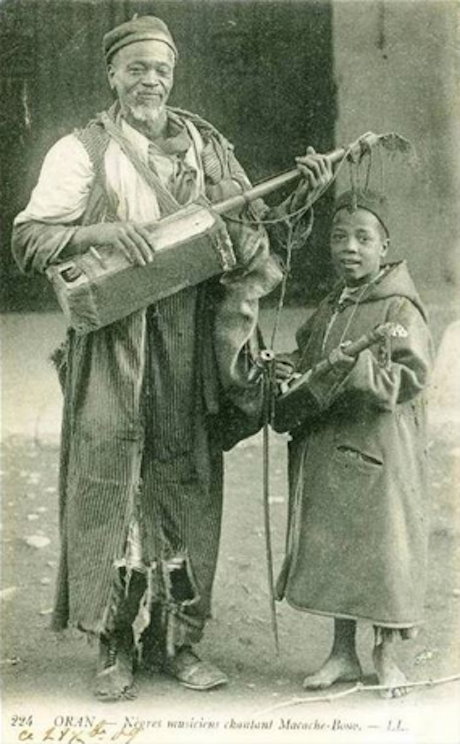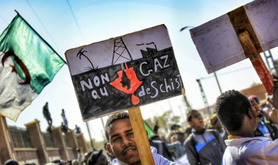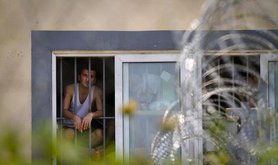Diwane is more than just a music genre; it is a socio-cultural practice, a form of music therapy and redemption. It emerged many centuries ago, following the arrival in the Maghreb (Algeria, Morocco and Tunisia) of the first waves of black slaves brought in by the slave trading caravans travelling through Ghana, Timbuktu, Abalessa, Mali, Guinea and Sudan.
The origins of a black African community in the Maghreb can be traced back as far as Sultan Ahmad al Mansur of Morocco’s conquest of the Songhai Empire in western Sahel in 1590. The sultan took advantage of civil strife in the empire and dispatched his army across the Sahara to conquer and pillage, bringing north several thousand men and women as slaves and servants.
Great pain and suffering was the inevitable result of the uprooting and enslavement of these diverse populations, who in exile took on a collective identity that gave birth to a new form of expression. Like any art, it was used to exteriorise feelings, voicing the torments of slavery and exile and serving as a reminder of motherland, ancestors, and prevailing social injustice. It gave birth to the Diwane in Algeria, the Gnawa in Morocco and the Stambali in Tunisia, all of which have more similarities than differences.
A Diwane musician of Algeria with his guembri, around 1901. Wikimedia Commons. Some rights reserved.
Tamara Turner, a doctoral researcher in ethnomusicology, specifically the musical repertoire and history of Diwane, says that this musical conglomeration of the many ethno-linguistic groups who were brought to North Africa—Bambara, Hausa, Songhai, Fulani/Peul, Bornou, and Boussou—shows mostly Hausa and Songhai influences.
Diwane became deeply rooted in the culture of the Algerian southwest and some circles in the southeast. Its practice remains exclusive and is reserved for connoisseurs of its rituals and spiritual dimension.
Over almost five centuries, the practices metamorphosed through the adoption of Islam as a religion and through close contact with the Berber-Arab culture of the Maghreb. This gave way to a new form of congregation, in the form of brotherhoods and zaouias (institutions) dispersed throughout the region, which perform healing rituals for Diwane followers and those who seek healing and spiritual guidance. The rituals are considered sacred and their methods are diligently kept secret.

Diwane in the family - Oran, west Algeria. Algiers Archives/Wikimedia Commons. Some rights reserved.
Diwane is part of a system of secret knowledge much like Sufism, and for a long time it was accessible only to the privileged few who had earned the knowledge. The master (ma’alem) conducts ceremonies known as hadra, or lila, an entire night of rich song, music, dance, costume, and incense, ending around dawn. The ritual enables partakers to enter the trance state of jadba for therapeutic and healing purposes, although there are those who believe it has supernatural power.
These ritual songs and lyrics were passed down for generations, transmitted orally from the ma’alem to the guendouz (disciple), never transcribed or translated. Composed in the different dialects of the Sahel region, they relate stories and legends of the past, of their slave ancestors, of separation from the land, abduction and ultimately redemption.
With Islamic influence, the lyrics shifted to invocations of God, the Prophet Mohammed and various Muslim saints, moving closer to strands of Sufism. Diwane is always performed following the minimalist melodies of a guembri, the looped rhythms of the metallic karkabou, or the beat of the bendir.
A Diwane night in Béchar, the capital of Diwane
Modernisation of Diwane
Although Diwane remains protected and exclusive to private ceremonies in certain regions of southern Algeria, where zaouias and Sufi-inspired brotherhoods prosper, this is inevitably changing. The rise of the ‘world music’ scene has meant the fusion and commercialisation of the music, which is frowned upon by the older generation and by the ma’alems. They strongly believe that the purpose of Diwane is healing, and find it upsetting that the younger generations vulgarise this music by playing it on stage “for money" and "glory," ignoring ancestral traditions.
However, some ma’alems have come to terms with the popularity of the genre and have found a middle ground where they recognise both dimensions, the musical and the spiritual, and separate between the Diwane of the stage and that for healing/ritualistic purposes. One ma’alem explained that in the latter, the followers follow a structure where the ritual takes precedence, whereas on stage it is the music that trumps, played for a public that becomes the master of the lila.
In recent years, Diwane has become a very prominent genre on the Algerian music scene (much like gnawa in Morocco), with several national festivals dedicated to it and a lot more attention from the government. This does not, however, reflect any real change in the social status of the Afro-Maghrebi population.
In the last years, it has become a much tapped source for the Algerian musicians inspired by its rhythms and lyrics, such as Gnawa Diffusion and Gaâda Diwane Béchar. Their repertoires assert solidarity with other revolutionary music of the African diaspora, such as Gnawa and reggae, which also evoke the struggle for emancipation and freedom and suggest the possibility of redemption.
Diwane has to be experienced and not just listened to; Gaâda Diwane Béchar, one of the veteran Algerian Diwane groups, will be performing at Rich Mix on Thursday 28 May, bringing to east London a spiritual ceremony to heal all ills. Although they do not replicate the vivid healing ceremonies, they very much reflect the feel of the lila and perfectly exude the essence of the tradition. Gaâda Diwane Béchar’s musically induced trance and moving sound is accessible and enjoyable, and the late veteran world music DJ Charlie Gillett said of them in the Telegraph that they are as good as anything he’s heard in years.
Gaâda Diwane de Bechar performing Ya Chafi Ya Afi
Read more
Get our weekly email




Comments
We encourage anyone to comment, please consult the oD commenting guidelines if you have any questions.